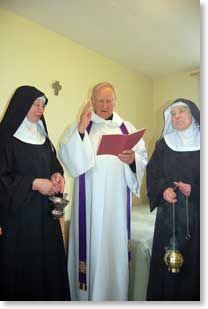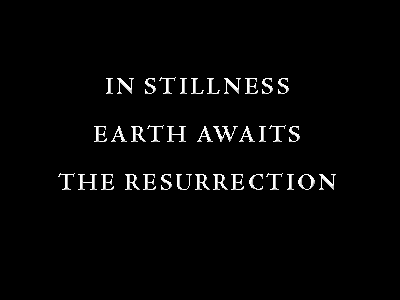30/April/2009 Filed in:
JottingsThis stage of Eastertide always seems to me a happy one. The Paschal candle is gradually burning down but there are more and more spring flowers to adorn its base, and we have sung "alleluia" in so many different ways that the whole Liturgy has become one great song of joy. Other aspects of life are not so jolly and the community is very mindful of the anxieties and sufferings of others. Our prayerline has been besieged by more and more people begging prayers for sick family members, for the healing of broken relationships and a way out of seemingly-impossible financial situations. Now the fear of a 'flu pandemic has begun to emerge. Fear is so crippling, yet it is the daily experience of many. "Perfect love casts out fear", true, but very few of us seem to be capable of that. We want to be brave and resolute, but faced with the unknown we become alarmingly concerned about ourselves, afraid of what MIGHT happen. I suppose one can derive a kind of statistical comfort from reflecting that there can be only one of two outcomes: what we fear will come to pass, or it won't; but none of us is entirely rational all the time, thank goodness.
The post-Resurrection appearances of the Lord Jesus clearly had a disturbing element since he was quick to reassure his troubled disciples about his identity and purpose. While thinking about the latest announcement from the WHO this morning, I kept reverting to Jesus' appearance to Peter in John 21. Poor Peter, he was so scared by what might happen that he jumped into the sea to get away from his Lord. There will be some who will go to similarly extraordinary lengths to try to escape the 'flu virus. But the end of the gospel story is telling. Jesus shared breakfast with Peter, a very ordinary, human act, then won from him a three-fold affirmation of love. In return, Peter received no promise, no assurance that all would go well with him, only a job to do and a reminder that he too must submit to an experience of powerlessness. Like Peter, we have to get on with the ordinary business of life, our "breakfast on the seashore". We do not know what the future holds, but each of us has a job to do; and we know that the very hairs of our head have been numbered.
23/April/2009 Filed in:
Jottings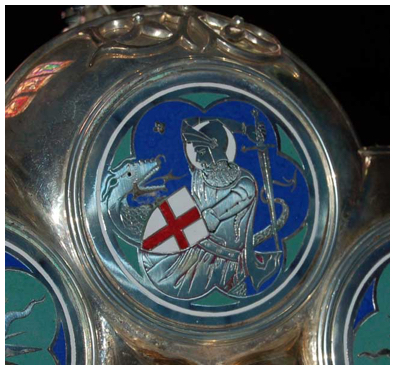
The Solemnity of St George is often treated with embarrassment by the English. Other nations rejoice in their patron saints, untroubled by the more fanciful elements in their vitae, but the English are too self-conscious, nowadays too serious, to make much of St George. (Yesterday's Budget will not have helped, of course.) True, the English flag will fly from hundreds of Anglican church towers (which makes a nice change from its usual place on the houses and cars of football fans) and the Society of St George will hold its customary dinner, graced by a lot of silver adorned with English roses; but it will be left to comparatively few to pray for the well-being of the English people and nation. What do we mean by praying for England and the English? We are surely not praying to become richer or more powerful or have some sort of international advantage over others. Rather, we are praying for Christian standards to inform our public and private lives, which is not inconsistent with Britain being a multi-cultural, multi-religious country. (I shall have lost our readers from overseas at this point, but essentially one can become British but has to be born English.) A truly Christian country would be a wonderful place in which to live whatever one's religious beliefs because charity, as St Paul says, is the one thing that can never hurt one's neighbour. The photo (see, we have listened!) shows a detail from a sanctuary lamp made when patriotism was less complicated and Catholicism more confident.
22/April/2009 Filed in:
JottingsWas pleased to read that the Pope spoke yesterday about using the internet as a new way to speak of God and search for truth. There would not be much point to this site, for example, if God were left out of it, but you may sometimes have to look beyond the surface of our prattlings. We have been reminded that we ought to put more photos up. So, today, on the
hospitality page you will find some photos of our guest room. I haven't adjusted the levels or curves so the paintwork looks a little flat. It is one of F & B's more subtle shades, "Pale Hound" (no reference to the dog intended), and is meant to help create an atmosphere of prayerful calm. The guest room was blessed by our Honorary Chaplain, Fr Anthony de Vere, during Lent and if you wonder why he is holding a Compline booklet, it was because he wanted to use the
Visita Nos as the final prayer! Handynun seems to have recovered from the flat-pack assembly, which is just as well because the oratory will need to be redecorated before we reserve the Blessed Sacrament there. Meanwhile, the garden has been given a radical make-over, so a few photos of that will follow. The Midsummer Concert is now organized (see the
Appeal page) and we have almost finalised our series of Trinity Lectures for later this summer. The first three are already in place: Dr Henrietta Leyser will talk about Christina of Markyate, Dr James France about the Cistercians and Dr Pauline Matarasso about Wulfric. So, watch this space . . .
21/April/2009 Filed in:
JottingsSt Anselm is one of my heroes, not least because he entered monastic life at the same age as I did ( it is always nice to find something in common with a saint, no matter how trivial), and I remember one glorious supervision at Cambridge when I battled for the Church and Philosophy against my supervisor's equally stout defence of King and Common Sense. (I think I won, because the poor man was afterwards heard to lament that he had been "taught more than he ever wanted to know about Anselm by an awful woman from X".) It is interesting how many people dismiss the ontological argument for the existence of God without really thinking about it. I could never pass the corner where Bertrand Russell threw his tobacco tin in the air and declared the ontological argument valid without thinking of Anselm. (Russell later decided the argument wasn't valid, but that's beside the point: he took the trouble to think the argument through). Anselm's Theory of the Atonement I find more troubling; but who could be indifferent to the charm of his meditations and prayers? Anselm is a reminder, to me at least, that Benedictines are called to be saints who bring every talent to bear on the Mystery of Faith. We need learned Benedictines, we need Benedictines who engage with the questions of the day; above all, we need Benedictines who, like Anselm, are humble in pursuit of truth. Credo ut intelligam.
17/April/2009 Filed in:
JottingsA day of Paschal Quiet in the monastery, and much needed! We have had a lot of visitors and more are expected next week. Getting the balance right between being welcoming and not destroying the very thing people seek when they visit is always difficult. The difficulty is compounded by the boring necessity of earning a living/cleaning the house/filling in our Tax Return/keeping appointments and generally doing everything else that living in this world requires. Fortunately, the monastic sense of humour is "an ever present help in time of trouble" (cf the "biblical" definition of a lie as "an abomination unto the Lord; and an ever present help in time of trouble", which shows the devil can cite scripture well enough.) I think the Risen Christ of the gospels had a keen sense of humour, too: eating broiled fish before the disciples' eyes, preparing a barbeque breakfast on the seashore, and teasing poor Peter into a threefold admission of love to counterbalance his threefold denial. I hope there's humour in heaven. If not, some of us are destined to linger a long time outside the door.
13/April/2009 Filed in:
JottingsLiturgically, the Octave of Easter is a but a single day, so we go on celebrating the Resurrection as an event that we recall TODAY, which gives a wonderful immediacy to what we do at Mass and in choir. The gospels that we read this week focus attention on different aspects of the Easter story, with each contributing something precious to our understanding. It is like looking at a a piece of filigree: intricate detail, but all subsumed to a greater whole. Our Podcast addresses that most fundamental of questions: do you believe in the Resurrection? Meanwhile, the community looks a little tired and wan. Today is a day for easing the yoke a little and allowing Brother Ass time and space for re-creation.
12/April/2009 Filed in:
Jottings
Christ is risen! Alleluia, alleluia, alleluia.
O happy fault, O necessary sin of Adam, to have gained for us so great a Redeemer! (from the
Exsultet or Easter Proclamation)
"So I saw in my dream, that just as Christian came up with the Cross, his burden loosed from his shoulders, and fell off his back, and began to tumble, and so continued to do, till it came to the mouth of the Sepulchre, where it fell in, and I saw it no more. Then was Christian glad and lightsome, and said with a merry heart, 'He hath given me rest by his sorrow, and life by His death.'" (John Bunyan,
Pilgrim's Progress; Christian concludes by giving three leaps for joy and goes on his way singing . . .)
Our regular Prayer Podcast will be posted later on Easter Sunday/Monday.
11/April/2009 Filed in:
Jottings10/April/2009 Filed in:
Jottings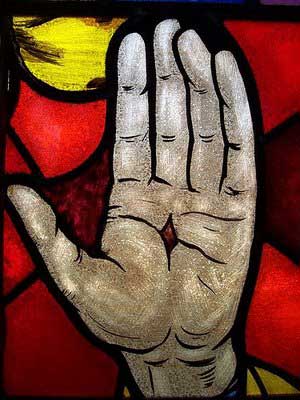
"See, I have graven you on the palms of my hands" (Isaiah 49.16)
Christus factus est pro nobis obediens usque ad mortem, mortem autem crucis.

(from the Liturgy, sung here in a live recording by monks of São Paulo)
"Come on, my frend, my brother most entere!
For the I offered my blood in sacryfice." (John Lydgate,
Vox ultima Crucis)
09/April/2009 Filed in:
Jottings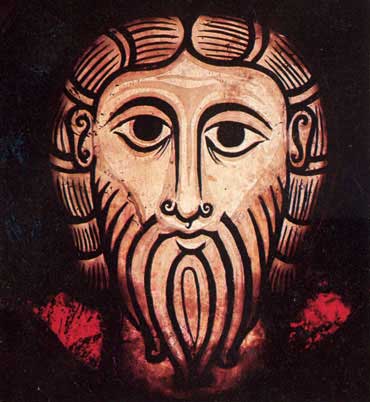
"Amen, amen, I say to you: one of you will betray me." (John 13. 21)
"Every one of my tears has been counted,
They are all of them written in your book" (Ps. 55[56]. 8)
"Lovely tear from lovely eye,
Why do you cause me woe?
Sorrowful tear from sorrowful eye,
You break my heart in two." (Medieval English Lyric)
05/April/2009 Filed in:
JottingsA bright, warm morning to open Holy Week, the greatest week of the Christian year. We shall probably not post much, if at all, this week, but here are a few thoughts on Holy Week (with apologies for the recording quality: noises off that we couldn't quite fathom).
04/April/2009 Filed in:
JottingsOn the rocks of humiliation this morning as the chantress for the week (guess who?) managed to forget entirely how to sing the Lauds tone for the day and put everyone else off. As we have removed the keyboard from the oratory for the duration of Lent, we all had to troop into the library in order to "remind ourselves" how the tone goes. These sudden fits of "aural amnesia" do have a flip side. When one regains one's sense of the tone, one hears it with new ears. I can't help feeling that Holy Week is a bit like that. Suddenly, we seem to lose our bearings. The liturgy plunges us into all kinds of contradictory moods and loses its familiar form, most shockingly on Good Friday. It takes the Easter Vigil to restore the harmony, and when we hear the Easter Alleluia, it is with newborn ears. Now there's a thought I might be able to work up for tomorrow's podcast . . .
02/April/2009 Filed in:
JottingsIt is easy to share one's joys, sorrows remain more private. On Palm Sunday we shall be commemorating the Lord's entrance into Jerusalem, his disciples dizzy with joy at their Master's triumph. On Maundy Thursday evening they will flee, afraid for their own lives, unwilling to have any part with him. On Good Friday he will die a shameful death with only his mother and John standing by. The easy triumph, the lonely death, and what an agony of abandonment between! Something of this pattern is to be seen in all our lives. We share our moments of happiness in an uncomplicated way, but our anxieties and fears, our deepest griefs, are more hidden. Perhaps we need to remember that the Light of the Risen Christ shines even in the depths of our sadness and our failures. There is nothing, absolutely nothing, that we cannot share with him, and the Sacrament of Penance, the Sacrament of Reconciliation, is an invitation to share not only our griefs but our shabby little failures, our whopping betrayals, our sins.

